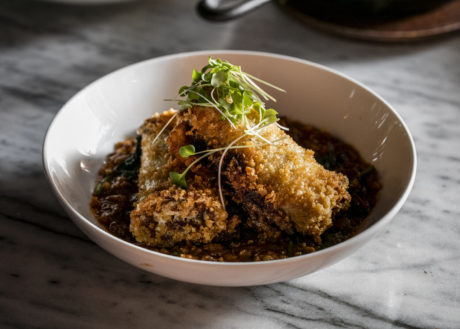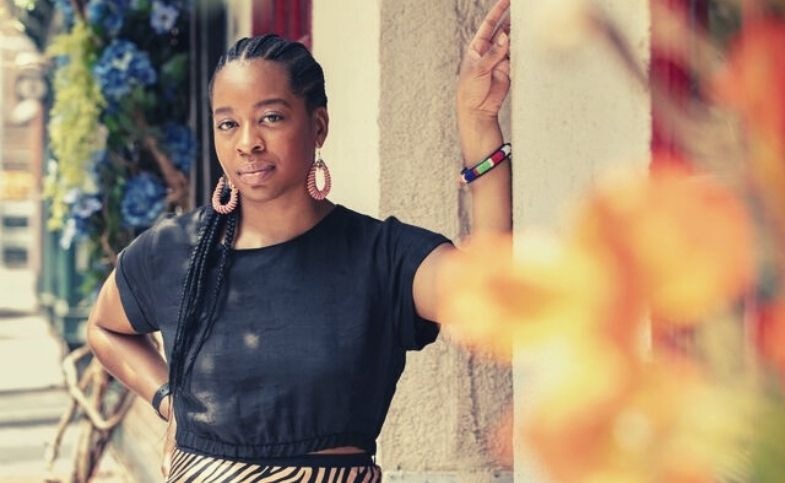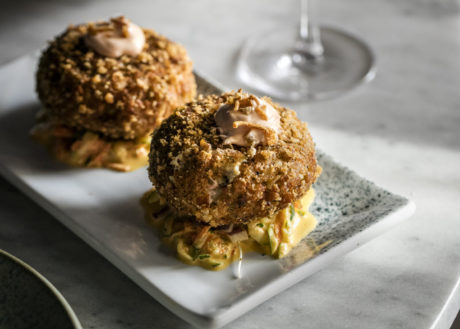Cadence, a restaurant with an exposed brick interior, a blue bar, and only eleven pink velvet seats inside, is located in the East Village, just around the corner from Tompkins Square Park. Cadence has gained rapid critical acclaim since its inception this spring: The New York Times named it one of the top 10 new New York restaurants of 2021 as well as one of their top 50 favorites in America, while Esquire put it to their top 40 in America. Why? Every dish in Chef Shenarri Freeman’s delectable, inventive take on soul food is vegan.
Crab cakes with chickpeas and hearts of palm, hot buffalo oyster mushroom sliders with pretzel buns, fried lasagna with pine nut ricotta, and cornbread with bee-free honey are among the dishes Freeman prepares at Cadence. Meanwhile, all of the wines on the menu are from Black-owned vineyards, such as Brown Estate in Napa Valley and Isiah Thomas’s Cheurlin Champagne.

Freeman, 28, grew up in a large family in Richmond, Virginia (22 first cousins and counting). From Thanksgiving meal to their Fourth of July picnic and Christmas brunch at Freeman’s mother’s place, food was at the heart of their relationship. She recalls, “There was always a lot of soul food—fried oysters, chitlins, certain basics.” “When it comes to soul food, there’s a little bit more love, thought, and care put into it,” she said, recalling a happy memory.
It aroused her interest in cooking as well. She worked as a line chef at a local music venue while attending Howard University in Washington, D.C., which led to a manager position at the popular downtown hangout Marvin. She enjoyed working in the hospitality sector, but the nocturnal lifestyle it demanded began to have an adverse effect on her health. “That simply meant a lot of late nights—a lot of Jameson, things like that—and not really keeping up with my health or my diet,” she says. “I was working too hard and not paying enough attention to my health.” As a result, she decided to make a lifestyle shift and became a vegan.
And she was ecstatic. “I became more serious about the culinary arts as a result of it,” she continues.
Freeman relocated to New York in 2019 and participated in the Institute of Culinary Education’s plant-based cooking curriculum. Soon after, the epidemic struck. She obtained a job as a manager for Overthrow Hospitality, an award-winning vegan hospitality firm created by Ravi DeRossi, while looking for work. DeRossi became acquainted with the young chef and listened to her pitch: While vegan eateries abound in Manhattan, according to Freeman, vegan soul food joints are few and far between. Cadence was given the spot when it became available.
Her vegan vision required over eight months of taste-testing to perfect. “The grits are my grandma’s mainstay,” Freeman adds, “and the palm cakes are comparable to the salmon cakes my mom used to prepare.” “I’m just giving them my own vegan and culinary spin.”
Despite the fact that everything on Cadence’s menu qualifies as comfort food, Freeman handles it with the utmost elegance, meticulously plating everything. “I wanted to create a space where people could enjoy their soul cuisine while also having a good dining experience,” she explains.
It’s a gastronomic cause that a lot of people can get behind. Veganism is gaining popularity in the United States as a result of the diet’s health and environmental benefits. According to The Economist, Google searches for “veganism” have doubled since 2015, and a quarter of 25- to 34-year-old Americans identify as vegan or vegetarian. Among Black Americans and other people of race, there is a particular resonance: According to a Pew Research Center study, 8% of Black Americans identify as rigorous vegans or vegetarians, compared to 3% of the general population.
Meanwhile, according to a Gallup poll released in January 2020, about a third of non-white Americans cut back on meat eating in the previous year, compared to around one-fifth of white Americans. Cadence and Freeman aren’t the only ones taking advantage of this trend. “I think I’m definitely opening up people’s minds to what vegan food and soul food can be—and bridging that gap together,” they say.












